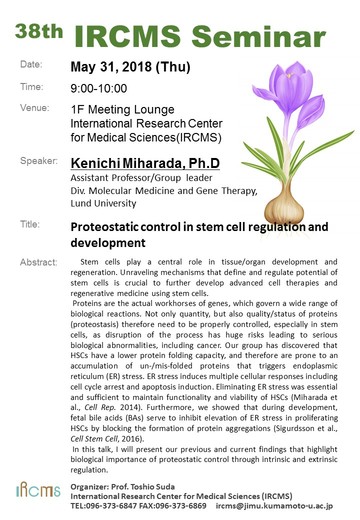- HOME
- IRCMS Seminars
- [May 31]38th IRCMS Seminar
IRCMS Seminars
[May 31]38th IRCMS Seminar
May 14 2018
We would like to inform you that the 38th IRCMS Seminar has been scheduled as below. We would be pleased to see many of you participating in the seminar.
Date : May 31, 2018 (Thu)
Time : 9:00 - 10:00
Venue : 1F Meeting Lounge, International Research Center for Medical Sciences (IRCMS)
Speaker : Kenichi Miharada, Ph.D.
Assistant Professor/Group Leader
Div. Molecular Medicine and Gene Therapy, Lund University
Stem cells play a central role in tissue/organ development and regeneration. Unraveling mechanisms that define and regulate potential of stem cells is crucial to further develop advanced cell therapies and regenerative medicine using stem cells.
Proteins are the actual workhorses of genes, which govern a wide range of biological reactions. Not only quantity, but also quality/status of proteins (proteostasis) therefore need to be properly controlled, especially in stem cells, as disruption of the process has huge risks leading to serious biological abnormalities, including cancer. Our group has discovered that HSCs have a lower protein folding capacity, and therefore are prone to an accumulation of un-/mis-folded proteins that triggers endoplasmic reticulum (ER) stress. ER stress induces multiple cellular responses including cell cycle arrest and apoptosis induction. Eliminating ER stress was essential and sufficient to maintain functionality and viability of HSCs (Miharada et al., Cell Rep. 2014). Furthermore, we showed that during development, fetal bile acids (BAs) serve to inhibit elevation of ER stress in proliferating HSCs by blocking the formation of protein aggregations (Sigurdsson et al., Cell Stem Cell, 2016).
In this talk, I will present our previous and current findings that highlight biological importance of proteostatic control through intrinsic and extrinsic regulation.

